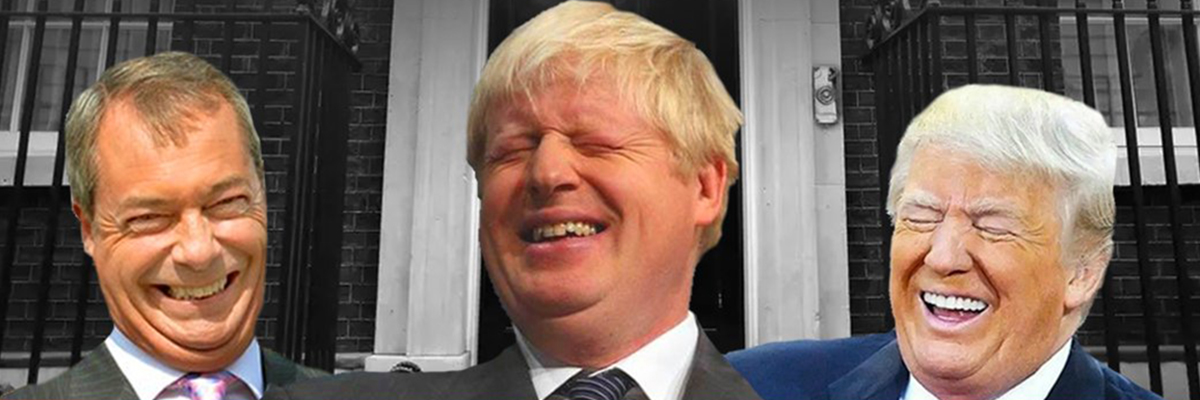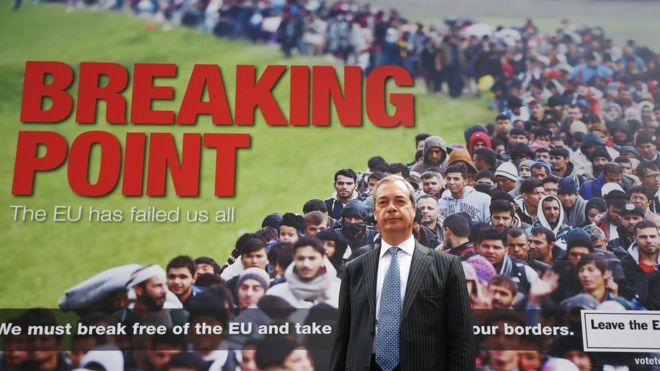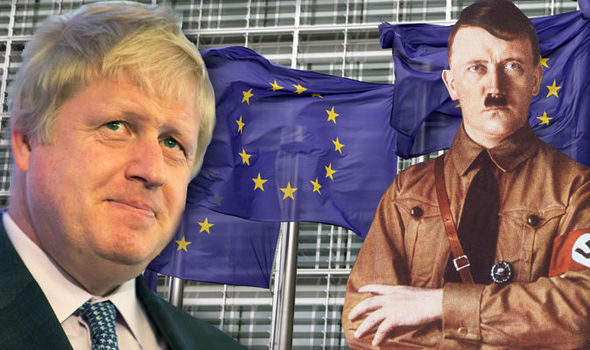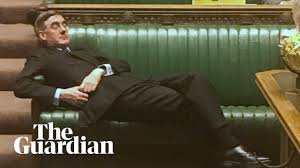Chief Brexit Cheerleaders!

Photo:libdems.org.uk
‘Brexit has happened. It is a defeat to be mourned.’
‘We have lost. We’re out. Stark words and a bleak reality. Britain has now left the European Union. Our departure is a tragic national error,... It is still opposed by around half of the population, by majorities in Scotland, Northern Ireland and London, and by most young people, all of whom are just as patriotic as those whose cause has won the day. It is a defeat to be mourned and learned from.’
Could this, ‘a tragic national error’ , be the path to make this nation’s nostalgic journey back to ‘Greatness’ a done thing?
As an incorrigible pro-European, I am grieving that we have left the European Union, in this ‘the most pointless, masochistic ambition in our country's history.’
Cry for a Nation whose Heroes were These!
Bad boys of Brexit: where are they now?
Brexit and other offensive words starting with the letter B
So, Brexit is done! But, with an eye on truth and honesty, first and foremost, we must remember, lest we forget:

Nigel Farage: one of the leading proponents to leave the EU,
standing infront of his immigrant poster which many people believe depicts "echoes" of the 1930s literature.
Photo: bbc.co.uk

'The EU’s goals and ambitions are the same as Hitler’s': Boris Johnson
Photo: express.co.uk
Another Chief Brexiteer Lounging in Parliament!

'It was one of the most consequential debates in parliamentary history. Indeed, the grave subject of whether or not to hand control of the Brexit process to those seeking to avoid no deal appeared to weigh particularly heavily on the shoulders of Jacob Rees-Mogg, who spent a significant portion of the time slouched on the government front bench.'-The Guardian
Long List of Brexit Lies:
We send £350m a week to Brussels
- We can’t stop a European army
- We are still liable to pay eurozone bailouts
- The UK rebate can be changed against our will
- Our VAT exemptions will be ended
- Cameron’s deal was not legally binding
- EU law is adopted by unelected bureaucrats
- We can’t control our borders in the EU
- Criminals arriving in Germany can get EU passports and come over here
- Health tourism costs us billions
- EU needs UK trade more than vice versa
- Past referendum results have been ignored
- Auditors still refuse to sign off the accounts
- CAP adds £400 to British food bills
- British steel suffers because of the EU
- Irish border will be unaffected by Brexit
- UK can’t deport EU criminals
- UK is always outvoted
- 60-70% of laws come from EU
- Renationalisation of industries is impossible
- We get no veto on future treaty change or integration
- The budget ceiling can increase without our consent
- We thought we were only joining a free trade zone
- (Compiled by Richard Corbett MEP, Leader of the Labour Members of the European Parliament)
And Finally, we must never forget who voted for Brexit and why
Brexit vote explained: poverty, low skills and lack of opportunities
(And they all became an easy prey to be whipped into a Pseudo-Patriotism and xenophobic fervor…Thus, hopefully, Brexit, not only is to make Britain ‘Great’ again, but, it will make it fairer, more just, more equal, and more human: Poverty and Being Poor in Britain Today )
Here and for now, I take solace and consolation, by recalling the wise and timeless words, as expressed in a Guardian Editorial on the day Britain left the EU*.
'We have lost. We’re out. Stark words and a bleak reality. Britain has now left the European Union. Our departure is a tragic national error, against which this newspaper has consistently argued. It is still opposed by around half of the population, by majorities in Scotland, Northern Ireland and London, and by most young people, all of whom are just as patriotic as those whose cause has won the day. It is a defeat to be mourned and learned from.
Some are celebrating today. Others are in despair. For many, it is simply a relief. All sides, though, should have enough humility to recognise that Britain leaves with an open national wound. It will take action as well as words to close the wound, and there has not been enough action. Commemorative tea towels and cheap triumphalism won’t cut it. But the truth must be faced. The referendum vote and the general election have made Britain’s departure from the EU inevitable. We have lost. We’re out.
In every other sense, though, Britain is still part of Europe. That is as true today, outside the EU, as it was yesterday, inside it. France is still visible from the south coast on a clear day. The Irish Republic is still a short drive from many places in Northern Ireland. The same winds blow over us out of a shared sky. Most travel in and out of Britain is to and from Europe. The EU remains by far our largest trading partner. Our security is rooted, now as ever, in Europe’s security. Many thousands of our ancestors died for it.
The bonds of geography and history, of climate and culture, of industry and commerce, of travel and study, will remain. So must the vast fund of common human sentiment that transcends the differences of language and national borders remain in place. The week in which Britain leaves the EU has been the week marking the 75th anniversary of the liberation of the Auschwitz death camp. The responsibility of passing the Holocaust story on to new generations is profound. That story is Europe’s story, and it is Britain’s story too. We may be out. But we’re not going anywhere. We’re still here. We are Europeans.
Dissatisfaction with democracy
Britain must face up to a changed political future. But as it does so, there are important lessons to learn from the immediate past. The Brexit vote was a revolt against many different things. Some unquestionably loathed the EU from the start, seeing it as a threat to sovereignty and even in a few cases as a German or a socialist plot. But membership of the EU may not even have been the most important issue for others. The Brexit majority also drew variously on a mood of discontent provoked by spending cuts, regional neglect, declining real wages, job insecurity, migrant labour, and gross inequalities in wealth. It was also, for some, a roar of rage against London, liberal elites, some of their values and much of the political system.
Only this week, it was revealed that 61% of British voters surveyed last year said they were dissatisfied with the country’s democracy. That does not mean they are right in all respects or that democracy is in existential danger. But it means these issues must be addressed. The three years of argument over Brexit after the referendum illuminated profound issues and had heroic moments. But in the end it was a turn-off for millions. In the election, Boris Johnson was able to carry the day on behalf of Brexit by offering it as a relief from the past, not as a bright beacon for the future.
Yet Brexit is not over. The separation has been agreed. But not the terms. We are now in transition for a further 11 months to an unknown destination. In practice, everyday life today will be the same as before. The country will not plunge into the abyss, a fact that will be shamelessly misrepresented over the coming weeks by Brexit supporters. For the rest of this year, EU rules and obligations still apply. But it is a perilous period of uncertainty that cannot be brushed over with the false pretence that Brexit is “done”. A great public task of this year is therefore to ensure that close practical and commercial ties are maintained with the EU as seamlessly as possible after the transition ends on 31 December.
Mr Johnson continues to get away with having his cake and eating it over many aspects of Brexit. That’s his way. But Brexit is a process of rule-making, not just a slogan. The prime minister will have to make a choice about this. He can opt, as he should, for the overwhelming national strategic and economic interest of close ties. Cooperation with the EU should be at the heart of his approach. Or he can embrace the maximal divergence from the EU that rightwing Conservatives have tried to make synonymous with Brexit. Huge issues are at stake in making this choice, not least the future of this country itself. The futures of Northern Ireland and Scotland as parts of the UK are umbilically linked to the decision. So too is Britain’s place in the world.
Lessons for Britain and the EU
Britain is an important nation. But it is not a global power. The power to control the world in the era of Donald Trump and Xi Jinping does not rest with Britain. It rests with cooperation, alliances and enforceable laws. For all its faults, the EU gave Britain far more clout in this effort. A world whose challenges are dominated by climate emergency, unrestrained multinationals, cybercrime, data-harvesting, terrorism and rising nationalism is not a world looking to Mr Johnson for solutions. A Britain that embraced unrestrained competition with Europe and the world would be a loner. It would be a Britain with the power to disrupt but without the power to control or shape. It would be like Russia without the land or the weapons.
We want Britain to have the wisdom to succeed in this new era. But we also want the EU to succeed. Brexit holds lessons for the EU too. This is the first time in the 63 years of the union that a member state has left. Losing an important nation is not good. Britain is not the only European nation, large or small, that sometimes prefers to march to its own drum. A better EU would be one that is more comfortable with the practical union of compromises between large and small, east and west, north and south, than it actually is – not one that hankers, mistakenly, to be more overreaching, intrusive and homogeneous. A better EU would also be a more prosperous and dynamic EU than it is today.
One day, perhaps, Britain will choose to rejoin such an EU. We will miss our membership dreadfully. We fear that Britain risks avoidable suffering for abandoning it. We hope to be back. But that day will not come soon. Anything else is a fantasy. Now as before, Brexit or not, this relationship needs to be based on facts and real connections, not on fantasies. The Guardian, at least, is not leaving Europe. We are a European news organisation. Europe is our back yard. It’s in our hearts and it’s in our DNA. We will do everything we possibly can to report on Europe, to Europe, and for Europe. Perhaps, like many pro-Europeans, we haven’t done everything we could have done over the last 47 years to burnish the links. The lesson for us all is to do more, and to do it better. Long live Britain. Long live Europe.’ - *The Guardian view on Britain leaving the EU: still part of Europe
Finally, in the beautiful words of a Persian sage, Rumi, when it comes down to Brexit:
‘Out beyond ideas of wrongdoing and rightdoing, there is a field. I’ll meet you there.’
And in order to be prepared for that eventual meeting, I wish to recall a selection of relevant postings which I had done about Brexit from the GCGI Archives:
“By the strength of our common endeavour we achieve more than we achieve alone.”
Eurosceptics should visit Coventry Cathedral: The EU's Higher Purpose (14 March 2016)
Brexit, Trump and the failure of our universities to pursue wisdom (26 November 2016)
Brexit: The Key Lessons- Now is the time for hope to build on the ruins (29 June 2016)
Britain today and the Bankruptcy of Ideas, Vision and Values-less Education (12 June 2019)
Dysfunctional & Delusional Governance: Posh Boys & Girls Ruining Britain (13 December 2018)
The Most Compelling Story of Boris Johnson’s Madness and his Nonsensical Brexit (09 October 2019)
Our Green and Pleasant Land, A Most Beautiful Country: Pity its led by Donkeys! (24 October 2019)
Why Are Our Politicians So Crap?’ The rise and fall of Britain’s political class (03 September 2019)
British democracy is brought to its knees (01 September 2019)
. Do you have an eye for justice and sense of duty? Then, these questions are for you. (07 August 2019)
The ‘Independence Day’, Not Long to Go! (09 March 2019)
..And now, Lest we forget… (14 August 2017)
‘One day, perhaps, Britain will choose to rejoin such an EU. We will miss our membership dreadfully. We fear that Britain risks avoidable suffering for abandoning it. We hope to be back. But that day will not come soon. Anything else is a fantasy. Now as before, Brexit or not, this relationship needs to be based on facts and real connections, not on fantasies. The Guardian, at least, is not leaving Europe. We are a European news organisation. Europe is our back yard. It’s in our hearts and it’s in our DNA. We will do everything we possibly can to report on Europe, to Europe, and for Europe. Perhaps, like many pro-Europeans, we haven’t done everything we could have done over the last 47 years to burnish the links. The lesson for us all is to do more, and to do it better. Long live Britain. Long live Europe.’
My Final Words
Britain is my home, my chosen country. I do love this green and pleasant land. In my own way, I am praying that all goes well for the UK and Europe. We must live together in peace and harmony, regardless. And hopefully, one day soon, in the not too distant future, we will again have leaders who are honest, truthful and will take us back into the heart of Europe again, where we belong. Carpe Diem!
